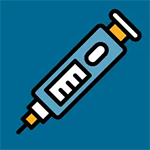Published: 2019. Next review: 2024.
This capability program supports junior medical officers and nursing staff care for people with diabetes in hospital, in particular, those people requiring insulin.
The program aims to improve outcomes and experience of hospitalisation, as well as reduce clinical variation and complications secondary to poor glycaemic control (hyper and hypoglycaemia).
Clinicians will have access to:
- a clinical decision support app ‘Thinksulin’ to support point of care decision making
- an eLearning program on My Health Learning. Content is currently unavailable while clinical review is underway.
While the program is for junior medical officers and nursing staff (without specialist skills or knowledge in diabetes management), it can be used by any clinician responsible for the prescription and administration of insulin.
Components
Thinksulin - a clinical decision support app

A point of care app that provides information and decision support on blood glucose level targets, hypoglycaemia management, blood glucose monitoring, basal-bolus calculations and charting and reviewing doses.
Available for free on the App Store and Google Play Store.
eLearning modules
There are six modules in this learning path. Content is currently unavailable while clinical review is underway.
- Basics of blood glucose levels and insulin
- Preventing and managing hypoglycaemia
- Safely prescribing and administering insulin
- Non-insulin agents in a hospital setting
- Managing blood glucose levels in the perioperative period
- Preventing and managing glucocorticoid induced hyperglycaemia
Background
Glycaemic instability is commonly observed amongst inpatients with diabetes. Patients with diabetes are frequently admitted to hospital for treatment of conditions other than the diabetes. Therefore, insulin orders, administration and glycaemia management are the responsibility of general ward clinicians (including nursing staff and junior medical officers), not just endocrinologists or in-hospital diabetes services.
In addition, insulin is a high-risk medication.1 Error rates with insulin are not necessarily higher than with other medicines, but when problems do occur the consequences can be severe.
References
- Clinical Excellence Commission. High Risk Medicines. Accessed 8 Sept 2023.

